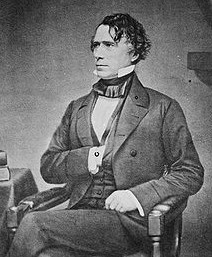
Franklin Pierce
usinfo | 2012-12-25 14:32

Franklin Pierce (November 23, 1804 – October 8, 1869) was the 14th President of the United States (1853–1857) and is the only President from New Hampshire. Pierce was a Democrat and a "doughface" (a Northerner with Southern sympathies) who served in the U.S. House of Representatives and the Senate. Pierce took part in the Mexican-American War and became a brigadier general in the Army. His private law practice in his home state, New Hampshire, was so successful that he was offered several important positions, which he turned down. Later, he was nominated as the party's candidate for president on the 49th ballot at the 1852 Democratic National Convention. In the presidential election, Pierce and his running mate William R. King won by a landslide in the Electoral College. They defeated the Whig Party ticket of Winfield Scott and William A. Graham by a 50 percent to 44 percent margin in the popular vote and 254 to 42 in the electoral vote.
He made many friends, but he suffered tragedy in his personal life; all of his children died when young. As president, he made many divisive decisions which were widely criticized and earned him a reputation as one of the worst presidents in U.S. history. Pierce's popularity in the Northern states declined sharply after he supported the Kansas–Nebraska Act, which replaced the Missouri Compromise and renewed debate over the expansion of slavery in the American West. Pierce's credibility was further damaged when several of his diplomats issued the Ostend Manifesto. The historian David Potter concludes that the Ostend Manifesto and the Kansas-Nebraska Act were "the two great calamities of the Franklin Pierce administration....
Both brought down an avalanche of public criticism." More importantly, says Potter, they permanently discredited Manifest Destiny and "popular sovereignty" as political doctrines.
Both brought down an avalanche of public criticism." More importantly, says Potter, they permanently discredited Manifest Destiny and "popular sovereignty" as political doctrines.
Abandoned by his party, Pierce was not renominated to run in the 1856 presidential election; he was replaced by James Buchanan as the Democratic candidate. After losing the Democratic nomination, Pierce continued his lifelong struggle with alcoholism and his marriage to Jane Means Appleton Pierce fell apart. His reputation was destroyed during the Civil War when he declared support for the Confederacy, and personal correspondence between Pierce and the Confederate President Jefferson Davis was leaked to the press. Pierce died in 1869 from cirrhosis of the liver.
Philip B. Kunhardt and Peter W. Kunhardt reflected the views of many historians when they wrote in The American President that Pierce was"a good man who didn't understand his own shortcomings. He was genuinely religious, he loved his wife, and he reshaped himself so that he could adapt to her ways and show her true affection. He was one of the most popular men in New Hampshire, polite and thoughtful, easy, and good at the political game, charming and fine and handsome. However, he has been criticized as timid and unable to cope with a changing America."
Education
Pierce attended school at Hillsborough Center and moved to the Hancock Academy in Hancock at the age of 11; he transferred to Francestown Academy in the spring of 1820. Friends recalled that just after he entered the school, he became homesick and returned home barefoot. Soon the boy walked the seven miles back to school. Later that year he transferred to Phillips Exeter Academy to prepare for college. In fall 1820, Pierce entered Bowdoin College in Brunswick, Maine, where he joined literary, political, and debating clubs.
At Bowdoin he met the writers Nathaniel Hawthorne, with whom he formed a lasting friendship,and Henry Wadsworth Longfellow. He also met Calvin E. Stowe, Seargent S. Prentiss, and his future political rival, John P. Hale, when he joined the Athenian Society, a group of students with progressive political leanings.
In his second year of college, Pierce had the second lowest grades in his class, but he worked to improve them; he ranked third among his classmates when he graduated in 1824. In 1826 he entered Northampton Law School in Northampton, Massachusetts, and he later studied under Governor Levi Woodbury and Judge Edmund Parker in their practice in Amherst, New Hampshire.
Pierce was admitted to the bar and began a law practice in Concord, New Hampshire, in 1827.
Share this page



















